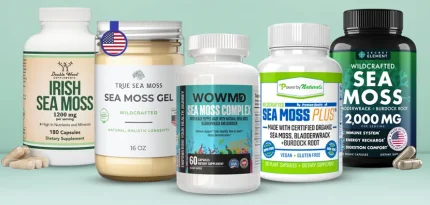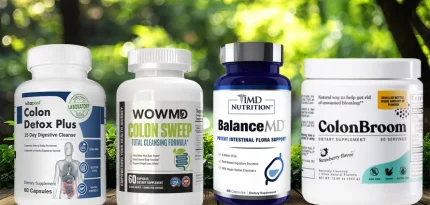Overview
Pregnancy is a beautiful, life-changing journey, but it can also feel overwhelming. Between the endless to-do lists, shifting energy levels, and the weight of making the healthiest choices for you and your baby, it’s easy to feel anxious about whether you’re doing enough.
You want to nourish your body, support your baby’s development, and stay strong for the months ahead—but finding the right tools to do that? Well, that’s tough.
If you’ve been looking for something to help maintain your strength, ease your worries, and support your growing baby—you might have heard of collagen supplements. Specifically, Prenatal Collagen Protein has been in the spotlight for some time.
This review will walk you through exactly what it is, how it works, and why it could be the missing piece in your prenatal care. Take a look.

Prenatal Collagen Protein Review – Health Insiders Images
What Is Prenatal Collagen Protein?
Prenatal Collagen Protein is a hydrolyzed collagen supplement created specifically to support the unique needs of women during pregnancy and postpartum.
This supplement is meant for baby growth, aiming to promote balanced prenatal blood sugar levels, and ease the physical changes your body experiences. That includes skin stretching and joint support.
We loved its purity and thoughtful sourcing. The collagen comes from the hides of grass-fed, pasture-raised, hormone-free bovines.
With its neutral flavor, this powder blends seamlessly into your favorite foods and drinks, from smoothies to coffee. It is designed to be taken before, during, and after pregnancy.
Prenatal Collagen Protein – Quick Facts & Specs
 Buy on Amazon
Buy on Amazon
*All the prices listed here are as they appear on their websites and are subject to change.
- Form:Powder
- Type:Hydrolyzed Collagen Protein
- Benefit:Supports baby growth, prenatal blood sugar, skin elasticity, joint health, and postpartum recovery.
- Brand:Needed
- Price:$49.99 for a one-month supply
- Used For:Fertility, Pregnancy, Postpartum, Women’s Health
- Active Ingredients:Hydrolyzed bovine collagen peptides
Pros and Cons of Prenatal Collagen Protein
- Ethically sourced from grass-fed, pasture-raised, hormone-free bovines
- Neutral flavor that mixes well with food and drinks
- Supports a range of health benefits including skin elasticity and joint health
- Not suitable for vegans as it is derived from bovine sources
- Requires regular use for optimal benefits, which may not suit all lifestyles
- The subscription model might not be ideal for those who prefer one-time purchases
- Limited to online purchases, which might not be convenient for everyone
- May prove too expensive for some users
Who is the Manufacturer of Prenatal Collagen Protein?
The manufacturer of Prenatal Collagen Protein is Needed, a U.S.-based company led by Julie Sawaya and Ryan Woodbury, two mothers and trained nutritionists. They are committed to improving women’s nutrition through research-backed solutions.
Needed collaborates with over 6,000 practitioners, including OB-GYNs and nutritionists, to set high health standards. The company is a Certified B Corporation and Certified Climate Neutral, ticking the ethical and sustainable practices boxes.
Focused on fertility, pregnancy, postpartum, and lifelong health, Needed emphasizes better outcomes for women and their families.
How Does Prenatal Collagen Protein Work?
Prenatal Collagen Protein supplies essential proteins that the body uses to promote baby growth, maintain healthy blood sugar levels, and support skin elasticity. According to a 2020 study, these proteins are critical in building healthy cells and tissues for both mom and baby.[1]
The supplement is made from hydrolyzed collagen, a type of protein broken down for easier absorption. This ensures your body can quickly use it where needed most.
Collagen is particularly effective at supporting joint health and strengthening pelvic floor tissues, both of which endure significant strain during pregnancy. It also aids skin stretching and recovery, helping reduce common postpartum concerns like hair thinning or loss of skin firmness.
Prenatal Collagen Protein Ingredients
For Prenatal Collagen Protein, the spotlight is on Hydrolyzed Collagen Protein. Here’s the science behind it;
Hydrolyzed Collagen Protein – Hydrolyzed collagen is a type of protein broken down into smaller peptides for easy absorption by the body.
It’s included because pregnancy and postpartum are periods of high physical demands when collagen levels naturally deplete. According to a 2020 study, this protein helps maintain skin elasticity, which is crucial as the body stretches and adapts during pregnancy. It also helps strengthen joints, which carry extra weight during this time.[2]
Hydrolyzed collagen even supports the repair of pelvic floor tissues and promotes faster recovery after childbirth.
But, it doesn’t stop there. Its benefits extend to supporting healthier hair and nails, which are often affected by the hormonal changes that occur during this stage of life.
Benefits of Prenatal Collagen Protein
Supports Skin Elasticity: During pregnancy, the body undergoes significant changes, including stretching skin. This product claims to promote skin elasticity, helping the skin adapt as the body grows.
Maintains Joint Health: Pregnancy places added strain on joints due to increased weight. This supplement aims to offer essential support, helping joints stay resilient and reducing discomfort throughout pregnancy and postpartum.
Promotes Postpartum Recovery: After childbirth, the body needs to heal and rebuild. Prenatal Collagen Protein may aid recovery by supporting the repair of pelvic floor tissues, which endure significant changes during delivery.
Helps Regulate Blood Sugar Levels: Maintaining healthy blood sugar is essential during pregnancy to minimize risks like nausea. The protein in the supplement may help balance blood sugar, benefiting both mother and baby.
Enhances Hair and Nail Health: Hormonal changes can impact hair and nail strength. Prenatal Collagen Protein aims to provide targeted support to promote fuller, healthier hair and stronger nails during and after pregnancy.
Prenatal Collagen Protein Side Effects
Based on user reviews and discussions, Needed Prenatal Collagen Protein generally appears to be well-tolerated, with few reported side effects. Most users appreciate its ease of mixing and the fact that it has no flavor, which makes it versatile.
However, some users say it can cause mild digestive discomfort like bloating or gas, particularly when first introduced to their diet. If you have to use it, we recommend you start with a smaller dose to see how your body reacts.
If you are concerned about the potential side effects, you can explore an alternative supplement called Performance Lab Nutrigenesis Multi for Women, which is generally safe to use and provides better benefits.
Is Prenatal Collagen Protein Safe?
Prenatal Collagen Protein is made from hydrolyzed collagen sourced from grass-fed, pasture-raised, hormone-free bovines. It is non-GMO and free of major allergens, including gluten.
The product is manufactured in facilities that adhere to rigorous quality and safety protocols. These factors are the reason it’s considered safe for prenatal and postpartum use.
To cope up with this condition Pelvic floor exercises can be useful and to get a detailed description, you can explore Pelvic Floor Strong, which teaches women simple exercises to strengthen their pelvic muscles, stop bladder leaks, and improve core strength through video guides and workbooks.
Prenatal Collagen Protein Customer Reviews
Here are some of the top comments from Prenatal Collagen Protein users;
The product it ok. It didn’t help with night sickness at all in the first trimester. I wouldn’t mix it with water because it doesn’t taste good & the texture doesn’t taste good either. I didn’t sign up for a subscription yet they charged my card and sent me three more bags after I already purchased a 3m supply. I still haven’t been refunded and it’s been at least six months.- Nicole
It has a bad taste to it. It doesn’t dissolve in cold drinks either, although the package says it can be added to hot and cold drinks. It just crumbles in cold drinks. I wish I could have returned it but there is no return policy. It was a waste of money.- Anonymous.
I appreciate the nutrition panel but unfortunately no matter the liquid or food i mixed this in, it tasted super bizarre, made the consistency unpleasant and made me have to throw away the whole meal once I tasted it with the powder in. As a weightlifter I’ve drank many different protein powders, so Im used to weird flavors, but this sadly was very hard to consume.- Anonymous.
How Does Prenatal Collagen Protein Rate?
| Feature | Rating |
|---|---|
| Supports skin elasticity | 3.8 |
| Maintains joint health | 3.9 |
| Promotes postpartum recovery | 3.8 |
How To Use Prenatal Collagen Protein?
Add one scoop of Prenatal Collagen Protein daily to your preferred drink, such as coffee, smoothies, or tea. For best results, the manufacturer recommends you make it part of your daily routine to meet protein needs.
Prenatal Collagen Protein: Packages, Deals, Prices
- One-month supply for $49.99
- Three-month supply (subscription) for $42.49 per month
- Six-month supply (subscription) for $37.49 per month
Where To Buy Prenatal Collagen Protein?
The best place to buy Prenatal Collagen Protein is the official website, which ensures authenticity, discounts, and great customer support. You may also find it on major online retailers like Amazon, or select health stores. However, purchasing directly from the website offers exclusive subscription savings and personalized service. Always choose trusted sources for quality assurance.
Final Verdict
Choosing the right supplement during pregnancy is not the easiest thing. Prenatal Collagen Protein, as we’ve seen, claims to help bridge this gap. It’s designed to support areas like skin elasticity and overall nutritional needs during and after pregnancy. The flexible pricing plans is also something we can’t overlook.
Listen, whether or not it fits into your routine depends on your unique needs and goals. Supplements like this aren’t a one-size-fits-all solution, so it’s okay to take your time weighing your options. Your decision should always feel right for you and your growing family.
Frequently Asked Questions
Q: Is Prenatal Collagen Protein safe to use during pregnancy?
A: Prenatal Collagen Protein is generally considered safe during pregnancy and is often used to support increased protein needs. With the guidance of your doctor, it helps with skin elasticity and joint health, both of which are strained during pregnancy.
Q: Can collagen help with stretch marks during pregnancy?
A: Collagen plays a role in skin elasticity, so it might help reduce the appearance of stretch marks. Although results vary, taking collagen as part of a balanced diet that includes vitamin C may support collagen production and improve skin resilience.
Q: What makes Prenatal Collagen Protein different from regular protein supplements?
A: Prenatal Collagen Protein focuses on providing amino acids like glycine and proline, which are vital for skin, joints, and connective tissue. While regular protein powders offer a range of amino acids for general muscle repair, Prenatal Collagen Protein specifically supports areas like stretched skin and strained joints during pregnancy.
Q: Can Prenatal Collagen Protein replace other protein sources in my diet?
A: No. Collagen should complement your diet, not replace other protein sources. Whole food proteins like lean meat, fish, eggs, and legumes provide a complete range of amino acids necessary for overall health. Pair collagen supplementation with a varied diet for optimal nutritional support.
2 Sources
Health Insiders relies on peer-reviewed studies, academic research institutions, and medical associations. We avoid using tertiary references. You can learn more about how we ensure our content is accurate and current by reading our editorial policy.
[1] Collagen at the maternal-fetal interface in human pregnancy: https://doi.org/10.7150/ijbs.45586
[2] Response to Hydrolysed Collagen Protein Supplementation in a Cohort of Pregnant and Postpartum Women: https://doi.org/10.4172/2376-127X.1000275

Health Insiders Team
The Health Insiders Team takes pride in bringing you the latest in nutritional research, skincare, healthy living, and wellness hacks. Together our researchers... [Read Full Bio]
 Marissa Ford, MS, RD, LD
Marissa Ford, MS, RD, LD


 This article changed my life!
This article changed my life!
 This article was informative.
This article was informative.
 I have a medical question.
I have a medical question.
 Ask a Question
Ask a Question

 This article contains incorrect information.
This article contains incorrect information.
 This article doesn’t have the information I’m looking for.
This article doesn’t have the information I’m looking for.
Rating Snapshot: